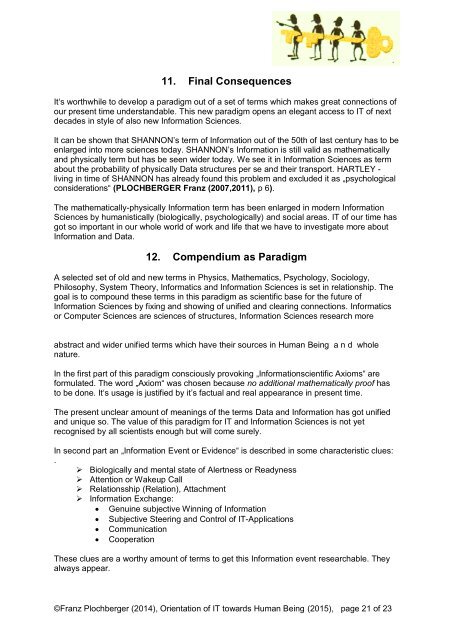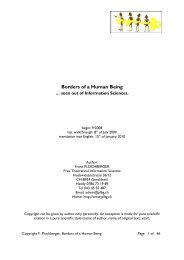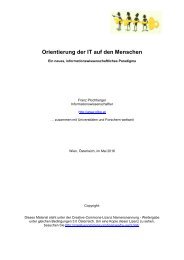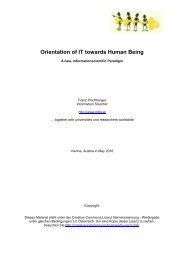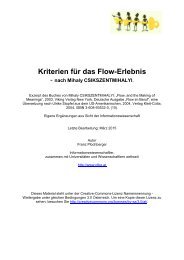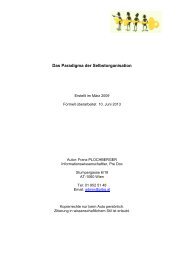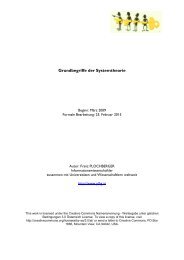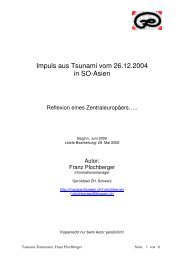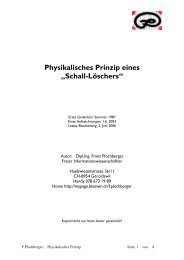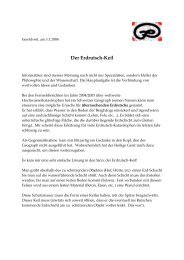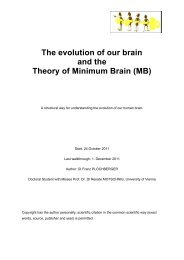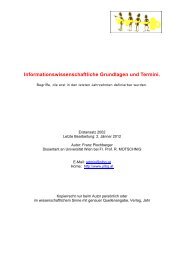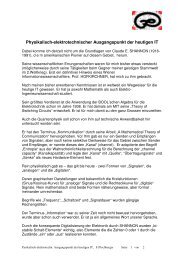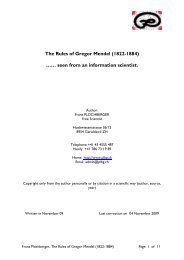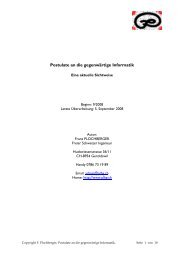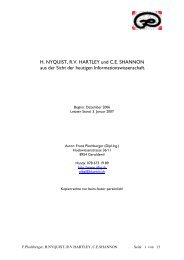Orientation of IT towards Human Being (2015)
Create successful ePaper yourself
Turn your PDF publications into a flip-book with our unique Google optimized e-Paper software.
11. Final Consequences<br />
It‘s worthwhile to develop a paradigm out <strong>of</strong> a set <strong>of</strong> terms which makes great connections <strong>of</strong><br />
our present time understandable. This new paradigm opens an elegant access to <strong>IT</strong> <strong>of</strong> next<br />
decades in style <strong>of</strong> also new Information Sciences.<br />
It can be shown that SHANNON’s term <strong>of</strong> Information out <strong>of</strong> the 50th <strong>of</strong> last century has to be<br />
enlarged into more sciences today. SHANNON’s Information is still valid as mathematically<br />
and physically term but has be seen wider today. We see it in Information Sciences as term<br />
about the probability <strong>of</strong> physically Data structures per se and their transport. HARTLEY -<br />
living in time <strong>of</strong> SHANNON has already found this problem and excluded it as „psychological<br />
considerations“ (PLOCHBERGER Franz (2007,2011), p 6).<br />
The mathematically-physically Information term has been enlarged in modern Information<br />
Sciences by humanistically (biologically, psychologically) and social areas. <strong>IT</strong> <strong>of</strong> our time has<br />
got so important in our whole world <strong>of</strong> work and life that we have to investigate more about<br />
Information and Data.<br />
12. Compendium as Paradigm<br />
A selected set <strong>of</strong> old and new terms in Physics, Mathematics, Psychology, Sociology,<br />
Philosophy, System Theory, Informatics and Information Sciences is set in relationship. The<br />
goal is to compound these terms in this paradigm as scientific base for the future <strong>of</strong><br />
Information Sciences by fixing and showing <strong>of</strong> unified and clearing connections. Informatics<br />
or Computer Sciences are sciences <strong>of</strong> structures, Information Sciences research more<br />
abstract and wider unified terms which have their sources in <strong>Human</strong> <strong>Being</strong> a n d whole<br />
nature.<br />
In the first part <strong>of</strong> this paradigm consciously provoking „Informationscientific Axioms“ are<br />
formulated. The word „Axiom“ was chosen because no additional mathematically pro<strong>of</strong> has<br />
to be done. It‘s usage is justified by it’s factual and real appearance in present time.<br />
The present unclear amount <strong>of</strong> meanings <strong>of</strong> the terms Data and Information has got unified<br />
and unique so. The value <strong>of</strong> this paradigm for <strong>IT</strong> and Information Sciences is not yet<br />
recognised by all scientists enough but will come surely.<br />
In second part an „Information Event or Evidence“ is described in some characteristic clues:<br />
.<br />
‣ Biologically and mental state <strong>of</strong> Alertness or Readyness<br />
‣ Attention or Wakeup Call<br />
‣ Relationsship (Relation), Attachment<br />
‣ Information Exchange:<br />
Genuine subjective Winning <strong>of</strong> Information<br />
Subjective Steering and Control <strong>of</strong> <strong>IT</strong>-Applications<br />
Communication<br />
Cooperation<br />
These clues are a worthy amount <strong>of</strong> terms to get this Information event researchable. They<br />
always appear.<br />
©Franz Plochberger (2014), <strong>Orientation</strong> <strong>of</strong> <strong>IT</strong> <strong>towards</strong> <strong>Human</strong> <strong>Being</strong> (<strong>2015</strong>), page 21 <strong>of</strong> 23


